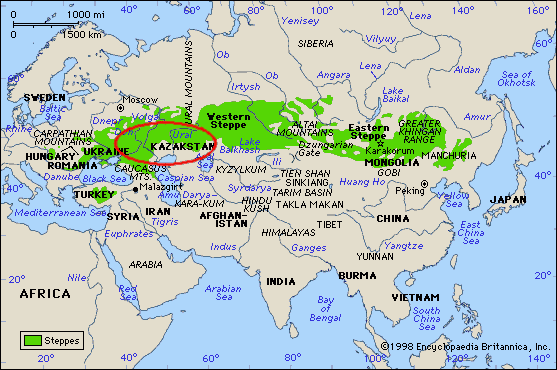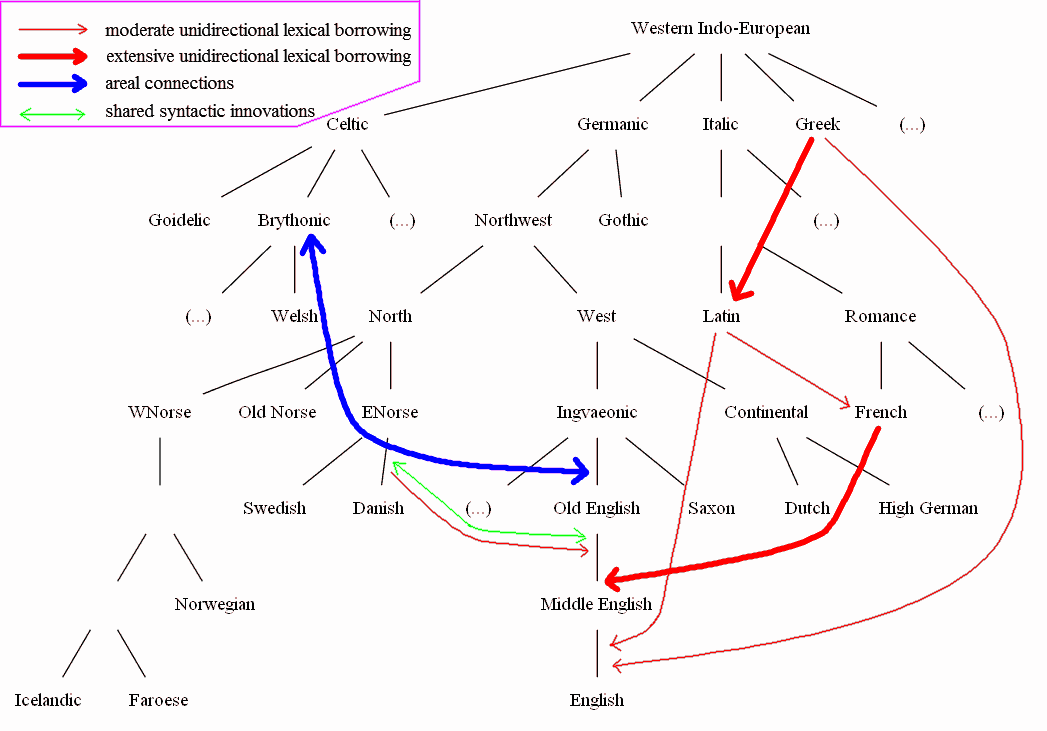印欧祖語の故郷
- Gimbutas による「クルガン文化」との関係づけ (#637)
- ウクライナ,ロシア南部,カザフスタンのステップ地帯

シリーズ「英語の歴史と語源」では,英語という言語がたどってきた波乱に富んだ紆余曲折の歴史を,世界史的な大事件と関連づけながら追っていきます.言語の歴史には文法や発音の歴史も含まれますが,本シリーズでとりわけ注目するのは語源,つまり単語の起源です.著名な事件と単語の起源とを結びつけながら,主にイギリスを舞台とする英語の歴史物語を,全12 回にわたり,つむいでいきます.
第1回では,英語の究極の祖先というべきインドヨーロッパ祖語に焦点を当てます.英語はもとよりフランス語,スペイン語,ドイツ語,ロシア語,ヒンディー語などを含む巨大なインドヨーロッパ語族は,紀元前4千年頃の南ロシアのステップ地帯に起源をもつとされます.実際,私たちの知る多くの英単語の語源が,この太古の時代にまでさかのぼります.6千年という時間を超えて受け継がれてきた数々の単語について,その由来をひもといて行きましょう.

1786年,Jones の記念碑的な講演 (#282)
The Sanskrit language, whatever be its antiquity, is of a wonderful structure; more perfect than the Greek, more copious than the Latin, and more exquisitely refined than either, yet bearing to both of them a stronger affinity, both in the roots of verbs and the forms of grammar, than could possibly have been produced by accident; so strong indeed, that no philologer could examine them all three, without believing them to have sprung from some common source, which, perhaps, no longer exists.
1870年代に手法が洗練され,20世紀までに現代の系統図がおよそ成立
| Luvian | pāta- |
| Vedic Sanskrit | pad- |
| Greek | pod- |
| Latin | ped- |
| Armenian | hotn |
| English | foot |
| Tocharian A | pe |
| Albanian | per-posh “under” |

| 身体 | arm, brow, ear, eye, foot, heart, knee, lip, nail, navel, tooth |
| 家族 | father, mother, brother, sister, son, daughter, nephew, widow |
| 動物 | beaver, cow, ewe, goat, goose, hare, hart, hound, mouse, sow, wolf; bee, wasp; louse, nit; crane, ern(e), raven, starling; fish, (lax) |
| 植物 | alder, ash, asp(en), beech, birch, fir, hazel, tree, withy |
| 飲食物 | bean, mead, salt, water, (wine) |
| 天体・自然現象 | moon, star, sun; snow |
| 数詞 | one, two, …, ten, hundred |
| 代名詞 | I, me, thou, ye, it, that, who, what |
| 動詞 | be, bear, come, do, eat, know, lie, murmur, ride, seek, sew, sing, stand, weave |
| 形容詞 | full, light, middle, naked, new, sweet, young |
| その他 | acre, ax(e), furrow, month, name, night, summer, wheel, word, work, year, yoke |
| 身体 | bone, hand, toe |
| 穀物・食物 | berry, broth, knead, loaf, wheat |
| 動物 | bear, lamb, sheep, †hengest (G Hangst), roe, seal, weasel |
| 鳥類 | dove, hawk, hen, rave, stork |
| 海洋 | cliff, east, west, north, south, ebb, sail, sea, ship, steer, keel, haven, sound, strand, swim, net, tackle, stem |
| 戦争 | bow, helm, shield, sword, weapon |
| 宗教 | god, ghost, heaven, hell, holy, soul, weird, werewolf |
| 住居 | bed, bench, hall |
| 社会 | atheling, earl, king, knight, lord, lady, knave, wife, borough |
| 経済 | buy, ware, worth |
| その他 | winter, rain, ground steel, tin |
印欧祖語からの単語に比べて,

| 言語 | 単語 |
|---|---|
| Afrikaans | apartheid, gnu, impala, indri, kraal, mamba, trek, tse-tse |
| Aleutian | parka |
| American Indian | chipmunk, moccasin, pow wow, skunk, squaw, totem, wigwam |
| Anglo-Saxon | God, Sunday, beer, crafty, gospel, house, rain, rainbow, sea, sheep, understand, wisdom |
| Arabic | algebra, assassin, azimuth, emir, ghoul, harem, hashish, intifada, mohair, sheikh, sherbet, sultan, zero |
| Araucanian | coypu, poncho |
| Australian | boomerang, budgerigar, dingo, kangaroo, koala, wallaroo, wombat |
| Brazilian | abouti, ai, birimbao, bossa nova, favela, jaguar, manioc, piranha |
| Canadian Indian | pecan, toboggan |
| Chinese | chopsuey, chow mein, cumquat, kaolin, ketchup, kung fu, litchi, sampan, tea, tycoon, typhoon, yen (=desire) |
| Czech | howitzer, pistol, robot |
| Dutch | bluff, cruise, easel, frolic, knapsack, landscape, poppycock, roster, slim |
| Eskimo | anorak, igloo, kayak |
| Finnish | sauna |
| French | anatomy, aunt, brochure, castle, cellar, challenge, chocolate, crocodile, cushion, debt, dinner, entrance, fruit, garage, grotesque, increase, jewel, justice, languish, medicine, montage, moustache, passport, police, precious, prince, sacrifice, sculpture, sergeant, table, trespass, unique, venison, victory, vogue, voyeur |
| Gaelic | banshee, brogue, galore, leprechaun |
| German | angst, dachshund, gimmick, hamburger, hamster, kindergarten, lager, nix, paraffin, plunder, poodle, sauerkraut, snorkel, strafe, waltz, yodel, zinc |
| Greek | anonymous, catastrophe, climax, coma, crisis, dogma, euphoria, lexicon, moussaka, neurosis, ouzo, pylon, schizophrenia, stigma, therm, thermometer, tonic, topic |
| Haitian | barbecue, cannibal, canoe, peccary, potato, yucca |
| Hawaiian | aloha, hula, lei, nene, ukulele |
| Hebrew | bar mitzvah, kibbutz, kosher, menorah, shalom, shibboleth, targum, yom kippur, ziggurat |
| Hindi | bungalow, chutney, dekko, dungaree, guru, gymkhana, jungle, pundit, pyjamas, sari, shampoo, thug |
| Hungarian | cimbalom, goulash, hussar, paprika |
| Icelandic | geyser, mumps, saga |
| Irish | blarney, brat, garda, taoiseach, whiskey |
| Italian | arcade, balcony, ballot, bandit, ciao, concerto, falsetto, fiasco, giraffe, lava, mafia, opera, scampi, sonnet, soprano, studio, timpani, traffic, violin |
| Japanese | bonsai, geisha, haiku, hara-kiri, judo, kamikaze, karate, kimono, shogun, tycoon, zaitech |
| Javanese | batik, gamelan, lahar |
| Korean | hangul, kimchi, makkoli, ondol, won |
| Latin | alibi, altar circus, aquarium, circus, compact, diocese, discuss, equator, focus, frustrate, genius, include, index, interim, legal, monk, nervous, onus, orbit, quiet, ulcer, ultimatum, vertigo |
| Malagasy | raffia |
| Malay | amok, caddy, gong, kapok, orang-outang, sago, sarong |
| Maori | haka, hongi, kakapo, kiwi, pakeha, whare |
| Nahuatl | axolotl, coyote, mescal, tomato, tortilla |
| Norwegian | cosy, fjord, krill, lemming, ski, slalom |
| Old Norse | both, egg, knife, low, sky, take, they, want |
| Persian | bazaar, caravan, divan, shah, shawl, sofa |
| Peruvian | condor, inca, llama, maté, puma, quinine |
| Polish | horde, mazurka, zloty |
| Polynesian | kava, poe, taboo, tapa, taro, tattoo |
| Portuguese | buffalo, flamingo, marmalade, pagoda, veranda |
| Quechuan | llama |
| Russian | agitprop, borsch, czar, glasnost, intelligentsia, perestroika, rouble, samovar, sputnik, steppe, troika |
| Sanskrit | swastika, yoga |
| Scottish | caber, cairn, clan, lock, slogan |
| Serbo-Croat | cravat, silvovitz |
| Spanish | albatross, banana, bonanza, cafeteria, cannibal, canyon, cigar, cobra, cork, dodo, guitar, hacienda, hammock, junta, marijuana, marmalade, molasses, mosquito, potato, rodeo, sherry, sombrero, stampede, supremo |
| Swahili | bongo, bwana, harmattan, marimba, safari, voodoo |
| Swedish | ombudsman, tungsten, verve |
| Tagalog | boondock, buntal, ylang-ylang |
| Tamil | bandicoot, catamaran, curry, mulligatawny, pariah |
| Tibetan | Koumiss, argali, lama, polo, shaman, sherpa, yak, yeti |
| Tongan | taboo |
| Turkish | aga, bosh, caftan, caviare, coffee, fez, jackal, kiosk, shish kebab, yoghurt |
| Vietnamese | ao dai, nuoc mam |
| Welsh | coracle, corgi, crag, eisteddfod, hwyl, penguin |
| Yiddish | chutzpah, gelt, kosher, nosh, oy vay, schemozzle, schmaltz, schmuk |

| 英語本来語(一般的) | フランス語(正式) | ラテン語・ギリシア語(知的) |
|---|---|---|
| ask | question | interrogate |
| book | volume | text |
| fair | beautiful | attractive |
| fast | firm | secure |
| fear | terror | trepidation |
| fire | flame | conflagration |
| foe | enemy | adversary |
| gift | present | donation |
| goodness | virtue | probity |
| hearty | cordial | cardiac |
| help | aid | assistance |
| holy | sacred | consecrated |
| kingly | royal | regal |
| lively | vivacious | animated |
| rise | mount | ascend |
| time | age | epoch |
| word | term | lexeme |
| 和語 | 漢語 | 西洋語 |
|---|---|---|
| おおうなばら(大海原) | 大洋 | オーシャン |
| おかね(お金) | 金銭 | マネー |
| およぎ(泳ぎ) | 水泳 | スイミング |
| おんなのこ(女の子) | 女子 | ギャル |
| かみのけ(髪の毛) | 毛髪 | ヘアー |
| かわや(厠) | 便所 | トイレ |
| くすりや(薬屋) | 薬局 | ドラッグストア |
| くるま(車) | 乗用車 | カー |
| さくらんぼ | 桜桃 | チェリー |
| たたかい(戦い) | 戦闘 | バトル |
| たまご(卵) | 鶏卵 | エッグ |
| ひとつ(一つ) | 一 | ワン |
| ひるめし(昼飯) | 昼食 | ランチ |
| やど(宿) | 旅館 | ホテル |
| Old English | ○Germanic vocabulary | 上代 | ○和語(やまとことば)が大部分を占めた. |
| ○monosyllabic bases | ○2音節語が基本. | ||
| ○derivation and compounding | ○中国との交流の中で漢語が借用された.例:茶 胡麻 銭 (なお,仏教とともに伝えられたことばの中には「卒塔婆」「曼荼羅」のような梵語(古代インド語=サンスクリット語)も含まれている.) | ||
| ○Christianity-related vocabulary from Latin (some via Celtic) | 中古 | ○漢語が普及した.例:案内(あない) 消息(せうそこ) 念ず 切(せち)に 頓(とみ)に | |
| ○few Celtic words | ○和文語と漢文訓読語との文体上の対立が見られる.例:カタミニ〈互に〉←→タガヒニ(訓読語) ク〈来〉←→キタル(訓読語) | ||
| Middle English | ○Old Norse loanwords including basic words | ○派生・複合によって,形容詞が大幅に造成された. | |
| ○a great influx of French words | 中世 | ○漢語が一般化した. | |
| ○an influx of Latin technical words | ○古語・歌語・方言・女房詞など,位相差についての認識が広く存在した. | ||
| Modern English | ○a great influx of Latin loanwords | ○禅宗の留学僧たちが,唐宋音で読むことばを伝えた.例:行燈(あんどん) 椅子(いす) 蒲団(ふとん) 饅頭(まんぢゅう) | |
| ○Greek loanwords directly | ○キリスト教の宣教師の伝来,また通商関係などにより,ポルトガル語が借用された.例:パン カルタ ボタン カッパ〈合羽〉 | ||
| ○loanwords from various languages | 近世 | ○漢語がより一般化し,日常生活に深く浸透した. | |
| ○Shakespeare’s vocabulary | ○階層の分化に応じて語彙の位相差が深まった. | ||
| ○scientific vocabulary | ○蘭学との関係でオランダ語が借用された.例:アルコール メス コップ ゴム | ||
| Present-Day English | ○shortening | 近代 | ○西欧語の訳語として,新造漢語が急激に増加する.例:哲学 会社 鉄道 市民 |
| ○many Japanese loanwords | ○英米語を筆頭として,フランス語,ドイツ語,イタリア語などからの外来語が増加する. | ||
| ○compounding revived | ○長い複合語を省略した略語が多用される. | ||
| ○loanwords decreased |